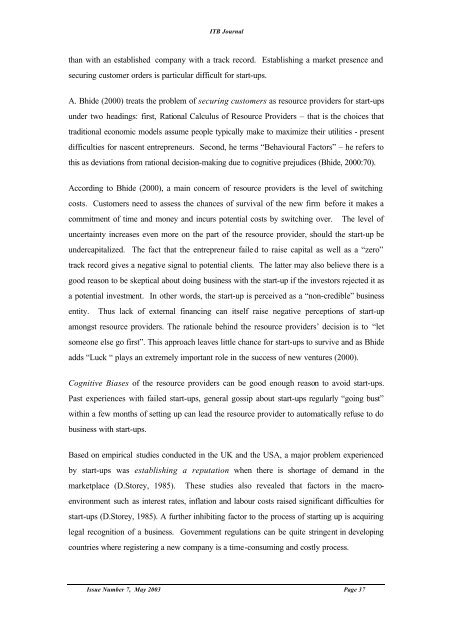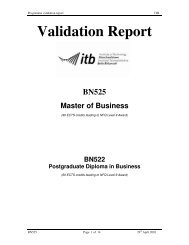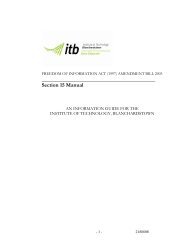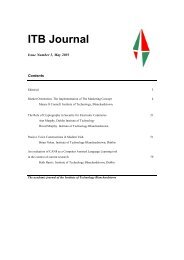ITB Journal-May-2003 - Institute of Technology Blanchardstown
ITB Journal-May-2003 - Institute of Technology Blanchardstown
ITB Journal-May-2003 - Institute of Technology Blanchardstown
You also want an ePaper? Increase the reach of your titles
YUMPU automatically turns print PDFs into web optimized ePapers that Google loves.
<strong>ITB</strong> <strong>Journal</strong><br />
than with an established company with a track record. Establishing a market presence and<br />
securing customer orders is particular difficult for start-ups.<br />
A. Bhide (2000) treats the problem <strong>of</strong> securing customers as resource providers for start-ups<br />
under two headings: first, Rational Calculus <strong>of</strong> Resource Providers – that is the choices that<br />
traditional economic models assume people typically make to maximize their utilities - present<br />
difficulties for nascent entrepreneurs. Second, he terms “Behavioural Factors” – he refers to<br />
this as deviations from rational decision-making due to cognitive prejudices (Bhide, 2000:70).<br />
According to Bhide (2000), a main concern <strong>of</strong> resource providers is the level <strong>of</strong> switching<br />
costs. Customers need to assess the chances <strong>of</strong> survival <strong>of</strong> the new firm before it makes a<br />
commitment <strong>of</strong> time and money and incurs potential costs by switching over. The level <strong>of</strong><br />
uncertainty increases even more on the part <strong>of</strong> the resource provider, should the start-up be<br />
undercapitalized. The fact that the entrepreneur faile d to raise capital as well as a “zero”<br />
track record gives a negative signal to potential clients. The latter may also believe there is a<br />
good reason to be skeptical about doing business with the start-up if the investors rejected it as<br />
a potential investment. In other words, the start-up is perceived as a “non-credible” business<br />
entity. Thus lack <strong>of</strong> external financing can itself raise negative perceptions <strong>of</strong> start-up<br />
amongst resource providers. The rationale behind the resource providers’ decision is to “let<br />
someone else go first”. This approach leaves little chance for start-ups to survive and as Bhide<br />
adds “Luck “ plays an extremely important role in the success <strong>of</strong> new ventures (2000).<br />
Cognitive Biases <strong>of</strong> the resource providers can be good enough reason to avoid start-ups.<br />
Past experiences with failed start-ups, general gossip about start-ups regularly “going bust”<br />
within a few months <strong>of</strong> setting up can lead the resource provider to automatically refuse to do<br />
business with start-ups.<br />
Based on empirical studies conducted in the UK and the USA, a major problem experienced<br />
by start-ups was establishing a reputation when there is shortage <strong>of</strong> demand in the<br />
marketplace (D.Storey, 1985). These studies also revealed that factors in the macroenvironment<br />
such as interest rates, inflation and labour costs raised significant difficulties for<br />
start-ups (D.Storey, 1985). A further inhibiting factor to the process <strong>of</strong> starting up is acquiring<br />
legal recognition <strong>of</strong> a business. Government regulations can be quite stringent in developing<br />
countries where registering a new company is a time-consuming and costly process.<br />
Issue Number 7, <strong>May</strong> <strong>2003</strong> Page 37
















